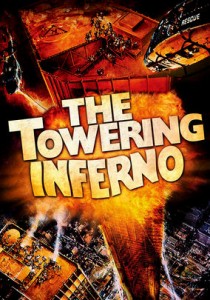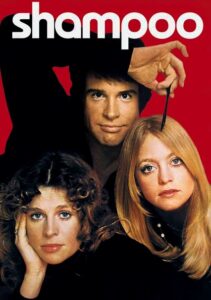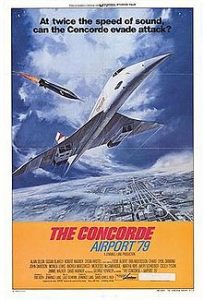The Towering Inferno-1974
Director John Guillermin
Starring Paul Newman, Steve McQueen, Faye Dunaway
Top 250 Films #41
Scott’s Review #194
Reviewed November 15, 2014
Grade: A
The Towering Inferno (1974) epitomizes the disaster film craze heaped on audiences throughout the 1970s (Airport, Airport ‘75 and ‘77, The Poseidon Adventure (1972), and Earthquake (1974) to name a few).
I am (guilt-free) a huge fan of this 1970s movie genre, though some certainly look down on it, I am not one of them and feel The Towering Inferno is one of the greatest.
The film is enormous and has such a sense of adventure and danger.
The grand film tells of the trials and tribulations of an enormous cast of characters trapped inside an inferno-flamed skyscraper – led by Paul Newman and Steve McQueen (fun fact- the two actors reportedly despised each other).
An incredible skyscraper is erected in San Francisco, at one hundred and thirty-eight floors it is professed to be the tallest building in the world and incredibly state-of-the-art. At the ribbon-cutting ceremony, an elaborate party is held atop the building overlooking the gorgeous Pacific Ocean.
Due to faulty electrical wiring, the building catches fire and the cast of characters faces one challenge after another to escape the grips of death.
The stellar cast features stars like William Holden, Faye Dunaway, Fred Astaire, Robert Wagner, Jennifer Jones, and O.J. Simpson in addition to Newman and McQueen.
The film is quite a soap opera style- numerous characters are introduced, many having affairs with each other or suffering some sort of conflict.
Wagner having a torrid office romance with his secretary played by then up-and-coming star Susan Flannery is deliciously sexy and I yearned to know more about both characters.
Holden’s son-in-law is responsible for the faulty electrical system yet blames his father-in-law for cutting budgets.
Another subplot involves Astaire’s character attempting to swindle Jones’s character but then falling in love with her. The plots are so melodramatic that, given the period of the film, it has a definite primetime television soap opera style to it- think Dallas or Dynasty in a state of peril.
I enjoyed the enormous cast and trying to guess who will be killed off next and in what elaborate way the film will burn them to death is a joy to watch- several victims fall or jump to their deaths, which eerily (and sadly) bring back morbid images of jumpers from the World Trade towers on 9/11.
The beginning of the film shows a dedication to firemen everywhere and the film has a definite moral and heroical quality to the firemen sent to rescue the people in the building. They are portrayed as heroes and intended not to be forgotten amid all the drama encompassing the story. This is admirable.
The special effects are elaborate and quite impressive- the glass elevator rescue scene is amazing! The beautiful set designs are a treat to watch as each lobby, apartment, or lounge in the skyscraper is exquisitely designed at the height of the 1970s style.
Every sofa or carpet featured is plush, colorful, and sophisticated. The skyscraper, made of glass, is an amazing element of the film, and the aerial views of the building, especially while ablaze are impressive, to say the least- remember- 1974 was long before CGI. I am assuming small replicas of the building were used, but what an achievement from a visual perspective.
The effects certainly champion the syrupy story elements.
My only small gripe with The Towering Inferno is, assumed to be 138 stories high, the action taking place at the top of the tower- the rooftop as well as the party scenes on the top floor- do not feel that high- The scenic outlook overlooking the water and some land feel about twenty-five stories high, not one hundred and thirty-eight.
Some find The Towering Inferno (1974) to be nothing more than schmaltzy drama- I say schmaltz was never done better.
Enjoy this feast of a big film.
Oscar Nominations: 3 wins-Best Picture, Best Supporting Actor-Fred Astaire, Best Original Dramatic Score, Best Song-“We May Never Love Like This Again” (won), Best Sound, Best Art Direction, Best Cinematography (won), Best Film Editing (won)


